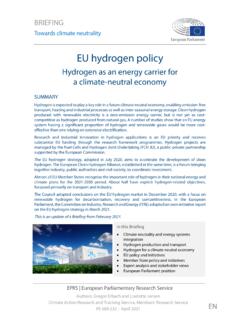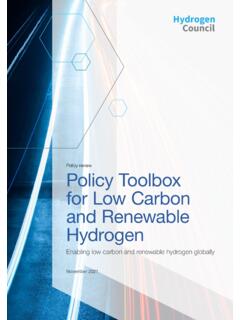Transcription of Environmental Impacts of Hydrogen-based Energy Systems
1 19 October 2006. Environmental Impacts of Hydrogen-based Energy Systems A new British study suggests that future Hydrogen-based Energy Systems may still disrupt climate, as hydrogen is a secondary greenhouse gas. Unless leakage from the synthesis and use of hydrogen is carefully controlled, the expected improvement in global warming gained from replacing fossil fuel-based Energy Systems would not be fully realised. There is increasing interest in the role that Hydrogen-based Energy Systems may play in the future, especially in the transport sector. They appear to be an attractive alternative to current fossil fuel-based Energy Systems in the future, since these have been proven to affect climate due to greenhouse gasses emissions. Nevertheless, any future Hydrogen-based economy would need to assess the possible global Environmental Impacts of such alternative Energy production. British scientists have recently reviewed current understanding of the fate and behaviour of hydrogen in the atmosphere and characterised its major sources and sinks.
2 They show that, contrary to most expectations, hydrogen is an indirect greenhouse gas with a potential global warming effect. They then quantified the global warming potential of hydrogen in comparison to CO2 and the global warming consequences of replacing the current fossil fuel-based economy with one based on hydrogen . The results suggest that because hydrogen reacts in the atmosphere with tropospheric OH radicals, the emission of hydrogen into the atmosphere would disrupt the distribution of methane and ozone, the second and third most important greenhouse gasses. Emissions of hydrogen lead to increased burdens of methane and ozone and hence to an increase in global warming. Therefore, hydrogen can be considered as an indirect greenhouse gas with the potential to increase global warming. The scientists have estimated that the potential effects on climate from Hydrogen-based Energy Systems would be much lower than those from fossil fuel-based Energy Systems .
3 However, such Impacts will depend on the rate of hydrogen leakage during its synthesis, storage and use. The researchers have calculated that a global hydrogen economy with a leakage rate of 1% of the produced hydrogen would produce a climate impact of of the fossil fuel system it replaces. If the leakage rate was 10%, then the climate impact would be 6% of that of the fossil fuel system. The current study suggests that a future Hydrogen-based economy would not be free from climate disturbance, although this may be considerably less pronounced that that caused by the current fossil fuel Energy Systems . Careful attention would have to be paid to reducing hydrogen leakage to a minimum if the potential climate benefits of a future global hydrogen economy are to be realised. Source: Derwent, R. et al. (2006) Global Environmental Impacts of the hydrogen economy , Int. J. Nuclear hydrogen Production and Application 1(1): 57-67.
4 Contact: Theme(s): Climate change and Energy , sustainable mobility, Environmental technologies Opinions expressed in this News Alert do not necessarily reflect those of the european commission To cite this article/service: "Science for Environment policy ": european commission DG Environment News Alert Service 1. european commission DG ENV. News Alert issue 39. October, 2006.


















